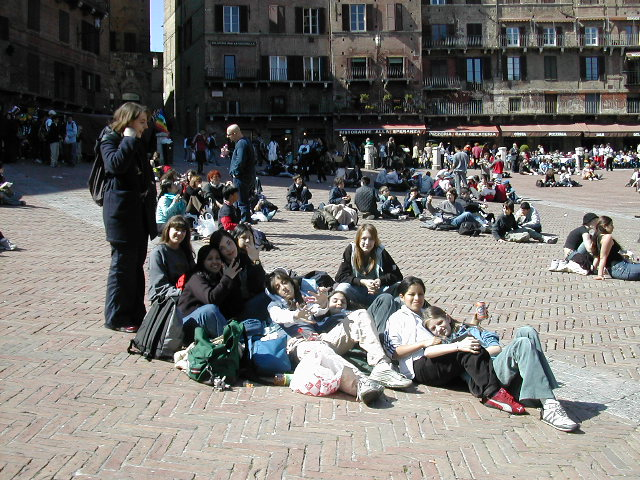written by my father, Al Straughan:
I do support the British and American troops in Iraq, though I regret that they are there and I believe that there are no good reasons for their being there. I further regret that all of this cannot simply end and the troops be withdrawn, because this would only be another betrayal of the Iraqi people. Europe and Britain and America cannot afford another betrayal in the Middle East. Neither can we afford the dilemma in which we now find ourselves. There are no easy answers, but we must continue to ask the difficult questions and search for answers.
Those who are now making policy and war, and were adults in the 1960’s, should remember where certain attitudes once took America; “winning hearts and minds” is one such attitude. I am Al Straughan, Deirdré’s Dad; I am one of those Americans, and I do remember those attitudes.
As each day in Iraq proceeds, my sense of deja vu is overwhelming. From July 1967 to July 1969 I took part in the American effort to “win hearts and minds” in Vietnam. This phrase refers to the so-called “Pacification Program,” in which I participated as an American Foreign Service Officer, specifically an employee of the U.S. Agency for International Development (USAID), the agency responsible for administering U.S. foreign assistance programs. In Vietnam, I was assigned to the office called “Civil Operations, Revolutionary Development Support” (CORDS), the proper name of the Pacification Program.
The British first conceived the idea of “pacification” during the Malaysian Emergency, when they built fortified villages known as “strategic hamlets”. This practice of separating a group of people from guerrillas was feasible in Malaysia, where the majority of the guerrillas were ethnic Chinese, recognizably different from the Malay majority. Winning hearts and minds in Malaysia meant that a separated and defensible population was safe from harm by guerrillas; this strategy helped to defeat the Malaysian insurgency.
American military and intelligence planners sought to repeat the Malaysian success by applying the pacification concept in Vietnam. Unfortunately, several key conditions were strikingly different in Vietnam. The vast majority of the natives of Vietnam were ethnically homogenous, and most of them simply and sincerely wished to be an independent country, free of colonial or neo-colonial influence and control. Throughout the American involvement in Vietnam, most Vietnamese openly or tacitly supported the ultimate aims of the National Liberation Front.
The aim of winning hearts and minds in Vietnam was illogical. On the one hand, Americans and their often-reluctant South Vietnamese allies were prosecuting war against other Vietnamese, and all Vietnamese suffered as a result. The planners said that “Strategic Hamlets” would offer sanctuary from the NLF, and a better economic life. In fact, the defending forces left these villages to their own devices at dusk. There were virtually no “pacified” areas anywhere in Vietnam after dark; this meant that there was never any real chance of winning hearts and minds, and America’s inability to admit to this was a daily betrayal of trust.
To this day, many Americans who served in Vietnam (and many who did not) feel that the war in Vietnam could have been won. Many never yet question whether this war should have been fought in the first place. Those who are making war in Iraq today fall into one or both of these categories.
Whether America is invading or liberating Iraq depends on one’s point of view. My own understanding of the United Nations Charter indicates that an invasion has taken place when one nation-state enters the territory of another nation-state, against that state’s will, through force of arms. We have come to understand the term “liberation” as referring to driving out the armed force of a nation-state that has invaded and occupied the territory of another nation-state (against its will),
through force of arms. Thus, the coalition that drove Iraq’s armed forces from Kuwait “liberated” Kuwait from Iraq’s occupying forces.
Under the UN Charter, as reiterated by Secretary General Kofi Annan, the “Coalition” forces have invaded Iraq. However, again as best I understand the term, this is not a “war,” as there has been no declaration of war. Most simply, the current situation might be best termed an (illegal) “military action.” This action has two stated objectives:
Objective 1. To remove Saddam Hussein and the Ba’ath party from power in Iraq, to “change the political regime” of Iraq through force of arms.
This objective must be achieved first in order to achieve the second objective, and it is justified based on Saddam Hussein and the Ba’ath party being guilty of crimes against humanity. There is no question that the Ba’athist regime has been guilty of crimes against humanity since it took power in 1963.
However: the Ba’ath party took power as the result of a coup that overthrew the King of Iraq, engineered by the CIA under orders from John F. Kennedy. The architect of this coup was Robert Komer, the chief of the Pacification Program in Vietnam when I arrived there in 1967.
As the United States was the agent of the Ba’athist assumption of power, is it (by the logic now current) also responsible for the crimes committed by that regime, particularly as America repeatedly provided the WMD’s that Saddam has used in the past, often at America’s urging.
If we apply the logic being used by George W. Bush and his War Cabinet, the United States would be guilty of war crimes
Objective 2. To disarm Iraq of its (putative) weapons of mass destruction (WMD’s).
This second objective rests upon the still-unproven assumption that Iraq actually possesses such weapons, and that this possession is a direct, or (through terrorist clients) indirect threat to the members of the coalition and to the peace and security of the international community. Thus far, – on Day 11 of the war – no WMD’s have been discovered.
George W. Bush and his War Cabinet clearly said, before the conflict began, that the (cowardly) “Iraqi army would fall to pieces when they saw American troops and they would then capitulate en masse.” Unfortunately, they did not, they have not, and they are not yet doing so.
Bush et al also told the world that the aerial “shock and awe” campaign would “take out” Iraq’s command and control structure and paralyze their ability to command or manoeuvre. Now on Day 11, two to three days of the repeated bombing of Iraqi TV and communications installation has not even been able to shut down TV transmissions. Although the Coalition military is clearly able to kill large numbers of Iraqi troops, these troops continue to be controlled by the regime in Baghdad and elsewhere. “Bunker Buster” bombs have penetrated hardened concrete, but targeting strategists have been no more able to locate redundant systems of communication than they have been able to pinpoint the location of Saddam’s person since the failed “decapitation” of Day 1.
“They’re taking off their uniforms and fighting as guerrillas!” (or) “They’re not fighting as guerrillas because the population does not support them.” (and) “They’re violating the Geneva Convention by photographing POWs.”
All of these contradictory statements raise a fundamental question: Has the “Coalition” declared war on Iraq? If so, I am unaware of it, as are the American Congress and the British Parliament. A similar question arose in Afghanistan and this (again, if I understand correctly) lay behind the status of those currently detained in Guantanamo Bay by American military forces:
America did not declare war in Afghanistan.
Therefore, America claims, the Geneva Convention on prisoners of war does not apply, and America has called the Guantanamo detainees “foreign combatants.”
(America did say that it would act in accordance with the Geneva Convention and there was no need for Amnesty International nor the International Red Cross to inspect their conditions.)
If you the reader are confused at this point, so am I.
But let€™s move away from international law – which nobody understands – and simply look at the reality of the situation on the ground in Iraq.
An informal coalition of foreign military powers has invaded Iraq with the stated intent of displacing the regime that holds currently holds power and then disarming the nation, after which it will administer the economic and political and foreign affairs of Iraq through a military governor appointed by the invading coalition.
If you were an Iraqi citizen, would you consider whether you were a “legitimate soldier” before you took up arms to defend your country? Would you worry about putting on a uniform? This is the reality of the ordinary Iraqi citizen, even though he or she may detest Saddam and the Ba’ath party. Moreover, should an Iraqi citizen wave in a friendly manner to a Coalition soldier (as we were told they surely would), that citizen is likely to be immediately shot as a traitor. There are reports earlier today that this happened to a woman in Basra — she was publicly
hung for waving to Coalition troops.
America told the world that we were in Vietnam at the request of the legitimate government, and that our objective was to help the Republic of South Vietnam to establish a democratic government and a free way of life. Over time, successive American governments came to believe that. The more we believed it, the louder we were prepared to shout it, and the greater our commitment in blood and money had to grow in order to make the world believe that we were sincere.
Oh, yes… we also had to require blood from the Vietnamese allies we were supporting.
George W. Bush and his War Cabinet told the world (and believed themselves) that the Iraqis were cowards who would quickly surrender and cheer the demise of Saddam Hussein and the Ba’ath party. The US therefore could not send a massive army to invade Iraq: “That would send the wrong message to the world.” The coalition army would have to be “slim and flexible”, “One of our boys is easily worth ten or even twenty of theirs!” “Anyway, the Iraqi people are just waiting to rise up, and then it will be all over!”
And so, over the strongest objections of the military (though this is now denied by General Franks), Rumsfeld sent a force only half as strong as recommended by those who had fought the Iraqis previously. Now the American and British troops in the field must wait up to thirty days for their forces to be doubled. Now, much like Vietnam, it’s the grunts who are betrayed by Pentagon Planners wearing 50s hairstyles and 40s eyeglasses and building policies from the times (and philosophy) of Richard the Lion-Hearted (who died, a long way from home, after losing to Saladin).
“Winning Hearts and Minds”, a Reprise
So now, George W. and his War Cabinet need excuses. Basra has become the microcosm that will tell us much of the future of this adventure. When we first heard of Basra, it was “not a military objective”. Now – at about 1600 GMT on 30/03/03 – Day 11 – it is a military objective. (However, I have not heard an update for over an hour.)
Three days ago, there was a “popular uprising” in Basra.
“Wait, Oh, no, it isn’t an uprising, it’s refugees trying to escape the cruel regime, and someone opened fire to prevent their escape.”
“Well, they were and are refugees, and they were caught in crossfire between the defenders of Basra (whoever they are) and Coalition troops.”
At the same time, we viewers of this increasingly surreal event have followed the story of a ship (improbably named “Sir Galahad”) “full” of food and water to aid the refugees and thereby “win their hearts and minds.” (“Full” is a relative term. Two hundreds tons of food and water will roughly cover Monday morning for over one million people.)
Wait a minute. Why are these people refugees? Because:
- People are shooting artillery and mortars back and forth, and many of the shells are landing on their homes.
- Food cannot be brought into Basra because of the fighting.
- Artillery has knocked out the electricity that powers the supply of water to the town.
In other words, they are refugees because the Coalition invaded Iraq.
In the next step, these refugees from the fighting will be brought to temporary shelter in a tent city somewhere. No doubt they will be grateful for these tents, as they are so much easier to maintain than the brick and mortar dwellings they once called home.
We can expect that there will be undercover enemy agents among these genuine refugees. The refugees, now loyal to the democratic way of life, must be protected against such agents, who presumably want to maintain an independent Iraq without a foreign military governor. This means that a military defence perimeter must be established and the refugee camp surrounded by barbed wire. Of course, the good refugees must be issued ID cards, and their movements in and out of the camp carefully monitored.
Now, the refugees will be happy and secure, and their hearts and minds considered to have been won.
Don’t laugh – this was essentially the method we used in Vietnam to determine that an area had been pacified.
Since the end of WWII, the United States has been responsible (at least as far as we know now) for the following changes of regime: Vietnam, Cambodia, Laos, Iran, Guatemala, Panama, Grenada, Afghanistan and, let us not forget…
Iraq – engineered by the CIA under orders from John F. Kennedy in 1963 under the direction of Robert Komer, later chief of the Pacification Program in Vietnam.
There was one other previous attempt to change a regime through force of arms, but the effort failed and nearly ignited a nuclear war: the invasion of Cuba. History has not yet judged the success of these changes of regime, but none was bloodless, and their justifications were always questionable.
The last clear, unambiguous victory of democracy happened in June, 1945, with the conclusion of WWII. Since that time, only one other “war” has ended with some degree of satisfaction for the generally democratic community: the Cold War. Every other military effort since June, 1945, has either clearly failed, or has left great unanswered questions lying amidst the blood and bodies and unfulfilled aspirations of the poor and hungry of the world. The great questions of hunger and oppression have never been resolved through military force; at best, it only postponed the issues.
Now Iraq, like Vietnam, has brought this entire set of issues into the 21st century, and it deserves a descriptive term of its own. I would like to offer “Wars of National Frustration” to characterize this latest pointless and horrific attempt to enforce the noble concept of democratic freedom through the illegitimate force of arms.
I hope that America can one day admit that it should never have fought the war in Vietnam.
I hope that America can one day agree that it is wrong to attempt to change the regime of another country by force.
I hope that America can one day commit its people, its resources, and its fundamentally decent and humane values to peaceful change, and assume the moral leadership of the fight against weapons of mass destruction by unilaterally destroying its own stockpiles of these terrible things that should never have been produced.
Al Straughan, in a village in the Chilterns, England – 30 March 2003






